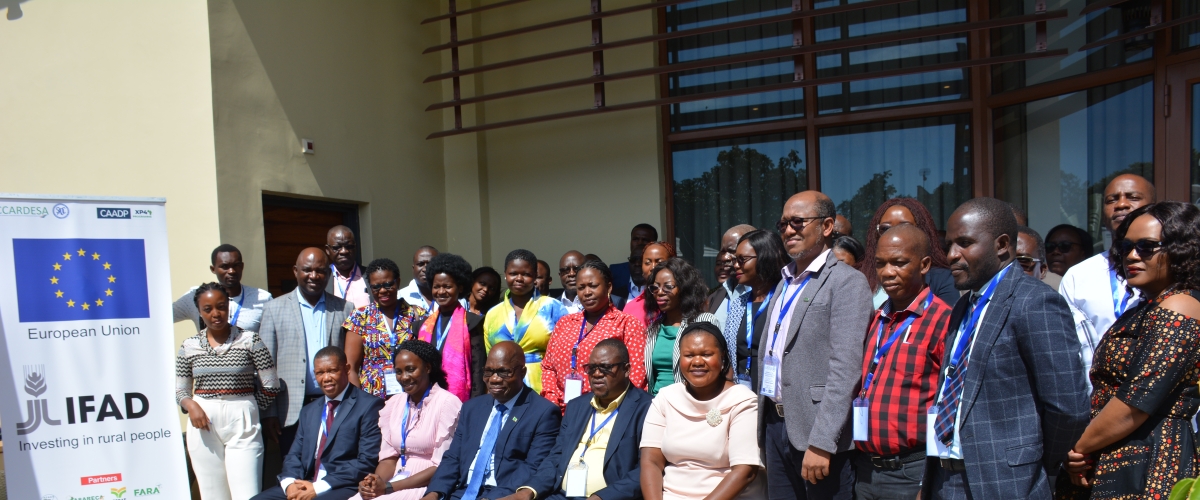
By Happy Mulolani
To improve livelihoods, the Centre for Coordination of Agricultural Research and Development In Southern Africa (CCARDESA)’s Comprehensive Africa Agriculture Development Programme Ex-Pillar 4 (CAADP-XP4) in partnership with the Forum for Agricultural Research in Africa (FARA) has embarked on an initiative to implement an African Foresight capacity building in the Southern Africa Development Community (SADC) region. The initiative is supported by the European Union (EU) and the International Fund for Agricultural Development (IFAD) through the CAADP-XP4 Programme.
This journey aims to equip member states in the SADC region with knowledge and skills through establishing national Foresight For Food systems hubs in Malawi and Zambia.
The training workshop is the first of its kind. It draws participants from experts, researchers, farmer representatives, and staff from the Ministry of Agriculture from eight SADC countries, including Botswana, Eswatini, Lesotho, Malawi, Namibia, Tanzania, Zimbabwe, and the host country, Zambia.
Speaking at the official opening of the training workshop, Agriculture Permanent Secretary Technical Green Mbozi explained that CCARDESA’s initiative is timely following the severe challenges posed by the prolonged dry spell induced by El Nino.
Mr. Mbozi was speaking when he officially opened the sensitization meeting in a speech by Zambia Agriculture Research Institute Director Dickson Ng’uni on his behalf. “Across the globe, climate change is viewed as the foremost challenge affecting sustainable development, the attainment of sustainable development goals, and poverty reduction,” Mr Mbozi reiterated.
Dr Dickson N'guni
He further pointed out that global warming is one of the detrimental factors impacting most parts of the world, including Southern Africa. Mr Mbozi expressed gratitude to CCARDESA for the initiative, which exposes researchers to valuable techniques to enhance resilience. He says this is due to extreme weather causing food insecurity, worsening inequality, and limited access to climate information for smallholders dependent on rainfall.
At the same event, CCARDESA Executive Director Cliff Dlamini said focusing on the relevance of the foresight for food systems training and establishing a regional hub is a priority. Professor Dlamini explained that CCARDESA endeavors to tackle the many challenges faced in the agriculture sector through this initiative.
“This is part of Ccardesa’s effort to promote forward-thinking on how innovation and knowledge can best help surmount its region’s diverse challenges to ensure agricultural promote research and innovation which are more responsive to future agri-food systems and related development needs,” Professor Dlamini emphasized.
He stated that the ever-changing dynamics impacting agriculture food systems extend beyond the borders of countries, hence the need for concerted efforts. This should position member states to “use strategic foresight to scan the environment and plan to see how to get favorable outcomes.” Professor Dlamini was speaking in a speech read on his behalf by CCARDESA Board Member Clemence Bwenje.
Dr. Clemence Bwenge
The three-day training workshop aims to sensitize stakeholders on foresight models for improved food systems at the national and regional levels. Through this training, CCARDESA envisions promoting forward thinking and allowing member states to establish hubs and promote research in agriculture in response to the food systems. This approach will ensure capacity building within AR4D and other stakeholders. To sustain the process and foster continuity, Champions for foresight will be identified. To offer insights into the food system's trajectory, documenting lessons learned and sharing experiences on the foresight of the food system will be critical.
Baitsi Podisi, the moderator of the meeting, stated that food systems are a pathway to reducing hunger and improving livelihoods by 2030. “This will require more actors across value chains to be more resilient and competitive,” Dr Podisi said.
Dr. Baitsi Podisi
One of the consultants, Professor Julius Gatune, says foresight should be taught in people’s minds to think of different ways of doing things and plan.
Professor Gatune urged participants to analyze food systems and their interactions, enabling them to develop policy options to transform food systems.
Prof. Julius Gatune
Foresight Expert from FARA , Dr. Abdulrazak Ibrahim, says there is a need to integrate foresight into the ministry’s strategic plan and examine organizations' different pillars and aims. “Various countries have different agendas and align to the implementation plan. For instance, one of the goals for the Africa Foresight Academy is to support foresight locally through specific ministries in the country,” Dr. Ibrahim said.
Dr Abdularazak Ibrahim
He restated that foresight on agriculture in Africa is not new, as several studies have been conducted previously. This is why there must be a framework to mainstream the foresight tool to achieve desired results. Dr Ibrahim stated that the future of food depends on the drivers and triggers of transformation, which need to be articulated as they vary across countries. The benefits of the foresight approach in country hubs will be key and helpful in boosting the transformation of innovation in agriculture and food systems.
The Author is the Principal Agricultural Information Officer for the National Agricultural Information Services (NAIS)





